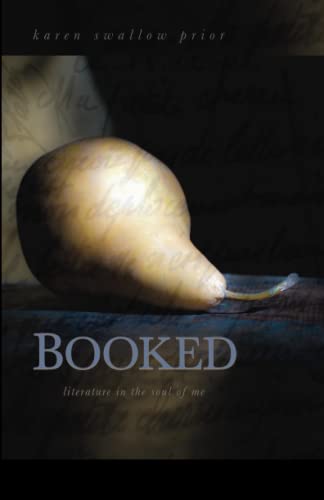 BEAUTIFUL READ!
BEAUTIFUL READ!I pretty much savored every bite of this book like I would this pear on its cover.
I had my library buy it, but once I started reading it, I realized I wanted to mark it all up so I did something I usually do not do: I bought it! That says a LOT about how much I liked this book!
There is so much to love. Karen Swallow Prior weaves some of her favorite works of literature with her personal journey of the soul. It was heart-warming. It doesn't hurt that many of her favorite works are my favorite works too.
The only work I was unfamiliar with was "Aereopagitica" by Milton. I think I loved this one best of all! Milton stated that books should be "promiscuously read":
In making his argument, as a churchman speaking to fellow churchmen, Milton cites the biblical examples of Moses, Daniel, and Paul, who were all steeped in the writings of their surrounding pagan cultures. Milton also invokes a leader of the third-century church who asserted that God commanded him in a vision, “Read any books whatever come into your hands, for you are sufficient both to judge aright and to examine each matter.” Such advice mirrors the Pauline suggestion to “test all things and hold fast to that which is good.” Milton puts it most profoundly when he says,
Well knows he who uses to consider, that our faith and knowledge thrives by exercise, as well as our limbs and complexion. Truth is compared in Scripture to a streaming fountain; if her waters flow not in a perpetual progression, they sicken into a muddy pool of conformity and tradition. A man may be a heretic in the truth; and if he believe things only because his pastor says so, or the Assembly so determines, without knowing other reason, though his belief be true, yet the very truth he holds becomes his heresy.
In other words, the power of truth lies not in abstract propositions but in the understanding and willful application of truth by living, breathing persons which can occur only in the context of liberty. (p. 21)
The “best books,” Milton argues, “to a naughty mind are not unappliable to occasions of evil.” On the other hand, “bad books,” Milton continues, “to a discreet and judicious reader serve in many respects to discover, to confute, to forewarn, to illustrate.” (p.23)This is precisely why I read books from these lists (see pages above)! I know some of my conservative friends may not like this, but I agree with Milton that these books have served me well and have opened my life up beyond my wildest dreams. I am a better believer because of it! They help me to become more "discreet and judicious" the more I read them, and they cause me to run even more quickly to Him who is the source of abundant life!
There is so much to this book. I loved this:
Some people think to abridge a classic work of literature is an act of sacrilege, but my junior high experience of reading an abridged Great Expectations might be likened to a child's first communion: a step taken in immature faith toward a fuller, richer experience to come." (p.56)Someone who speaks my language! I have been saying this for years, but the purists always put me down! I wholeheartedly believe that exposing kids before they are ready to unabridged classics poisons them from reading them as adults! I did this with my kids, and they love classics now!
There is too much about this book that I liked. It will probably be my favorite one for 2013 (Although I REALLY liked Of Virgins and Martyrs too). I have so many quotes, but I will just say go and buy it! It is amazing!

1 comment:
Such a tasty review! Makes me want to read BOOKED again! :)
I appreciate your thoughts about introducing kids to abridged classics. My oldest kids are 9 & 10.
Post a Comment